Budget 2019: Concluding Unscientific Political Postscript, with Apologies to Kierkegaard
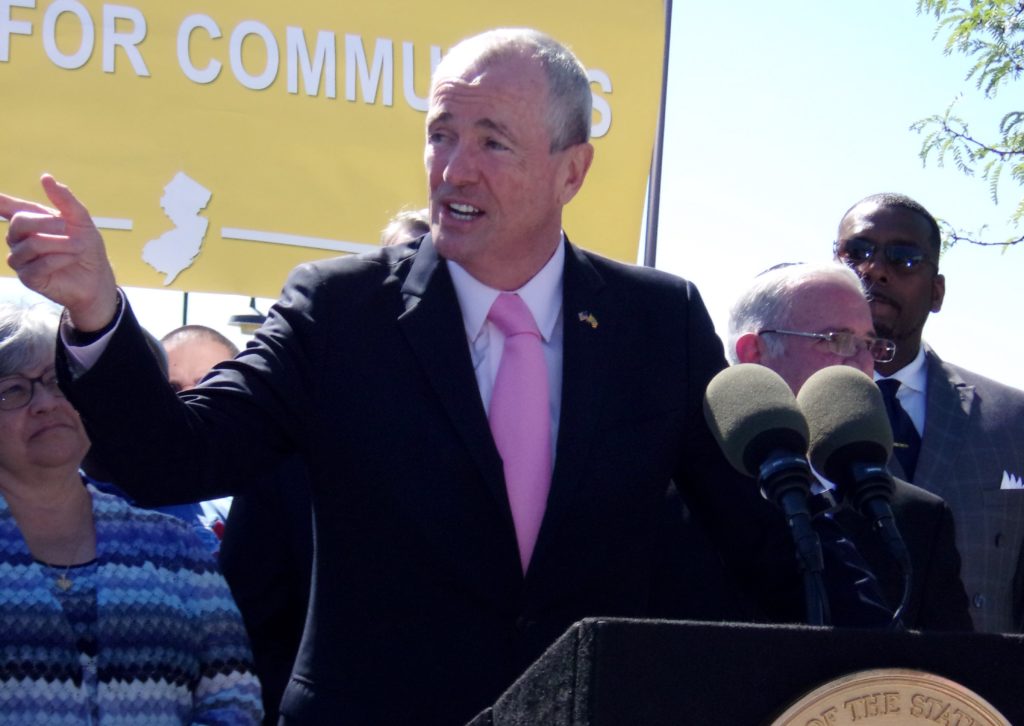
TRENTON - He craved the White House and the range of a more exalted sense of power, and to that end calculatedly badmouthed Democrats from his home state when he campaigned elsewhere. But come budget crunch time here in New Jersey, Republican Chris Christie dutifully picked up the phone and called Democratic kingpin George Norcross III (GN3), the last boss standing from a bygone era otherwise fire-hosed by Christie when he served as U.S. Attorney.
As long as Christie pleased Norcross, or at least respectfully worked with him, he could reserve his
[caption id="attachment_18292" align="alignright" width="300"] Christie[/caption]
Christie[/caption]
unchained ire for the likes of Assemblyman Reed Gusciora, Senator Loretta Weinberg (the pre-senate majority leader version), Jersey City Mayor Steve Fulop, Assemblyman Vinny Prieto, teachers, Senator Barbara Buono, and many others while at home; and fire-blanket Dems collectively while barnstorming the country on the presidential campaign trail. His selective targeting in the micro, which happened to dovetail nicely with Norcross' own hit list, complemented a harmless collective in the macro, and in return he received both the reinforcement of the Norcross Democratic Party establishment and its attendant functionaries, served up as reliable votes to maintain a fluid process - and adulation from rock-ribbed Republicans at the national level who welcomed a tough talking party champion. The only time the construct failed him was when someone from Team Norcross went off the reservation, as then-Speaker Sheila Oliver did when she refused to facilitate the expansion of charter schools, and as her replacement, then-Speaker Prieto did when he opposed the Christie-Norcross scheme to seize cash reserves from Horizon.
For the most part, it made for very smooth government, particularly when someone like Fulop - positioning himself for a gubernatorial run to succeed Christie - publicly bucked Norcross and Senate President Steve Sweeney (D-3). Then - acting in the duel capacity as aspirational Trump and Norcross hit man - the stars aligned with a vengeance.
"He's my kind of guy," Norcross could be heard opining when asked to size up the governor's first term efforts.
Elected as the successor to Christie, Governor Phil Murphy wanted to operate differently, his selection of the discarded Oliver arguably his first significant statement to that end. The machine had dumped Oliver, but Murphy found something salvageable, arguably most significantly the former speaker's status as one no longer beholden to GN3 priorities.
[caption id="attachment_23346" align="alignleft" width="300"]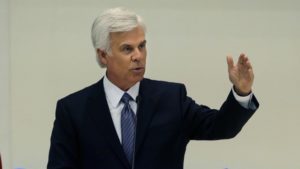 Norcross[/caption]
Norcross[/caption]
Norcross was skeptical.
"He's friendly - some say too friendly," the boss said with caution as Murphy made the rounds on the 2017 campaign trail, with Oliver of all people, whom Norcross had publicly criticized during her tenure as speaker.
Wading into his first budget as New Jersey's chief executive this year, Murphy never spared tire tread on that ceremonious trip to South Jersey; never even made that call to Norcross, intent on showcasing the leaderly, independent streak he claimed came with his Goldman Sachs millions, even if it made for a decidedly less smooth government process.
At the height of the collision last month between the legislature and the Governor, Murphy's critics said he needed simply to have picked up the phone and "called George," something all governors of recent vintage (in both parties) know they must do if they want to avoid the embarrassment of mangled budget operations. Norcross controls majorities in both houses (as revealed, just barely, and with the
[caption id="attachment_12593" align="alignright" width="300"]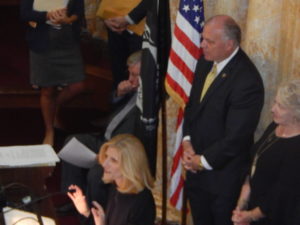 Corrado under Sweeney's watchful eye.[/caption]
Corrado under Sweeney's watchful eye.[/caption]
help of Republican Senators Kip Bateman and Kristin Corrado, by the votes in favor of [bubbleAutoLink text="alternative budgets" id="31616"] to the one presented by the Governor). The press would needle on a narrative about how Murphy refused to maintain a rigorous practice (learned on the campaign trail) of flattering individual legislators with sudden text messages and phone calls. It was true. But, arguably more importantly from the standpoint of how the budget finally went down, from the beginning, Murphy stubbornly rejected that Manichean pact with GN3.
The people had elected an independent financial fix-it man "by two touchdowns," Murphy loved to point out at press conferences; the Obama ambassador wasn't about to now humble himself - or that ideal - by relying on a Tammany-style boss tandem to run his government. Yes, he had the backing of 21 Democratic organization lines (including, of course, those South Jersey lines overseen by Norcross), but within a fractured national narrative, Murphy also aspired to fulfilling the priorities of the Bernie Sanders wing of the Democratic Party. His free community college agenda proved it, as did his sanctuary state comments in last year's general election, unnerving to his more conservative party allies who simply wanted to get reelected without having to opine on - of all things - issues.
Murphy had no problem using the party to land the office.
But he would not beholden to the party, such as it existed in New Jersey.
Someone with his wealth and national contacts could not expect to play the kind of Bruegel-like Trenton games of institutional homunculi. If the Governor had national ambitions, he perhaps fancied himself along the lines of Woodrow Wilson, who, once elected, fought the very bosses who had put him there, and in part on the strength of that anti-corruption narrative, propelled New Jersey's single successful presidential run. Christie had played it differently, and everyone saw what happened. It had worked, maybe even beautifully - for a time. By relying on the Norcross establishment majorities in a state where Democrats outnumber Republicans by 800,000, Christie freed himself nationally of looking like someone bogged down with the same processes that would plague Murphy early. But ultimately, his slovenly mugging for that camel hair-coated constituency with a local scandal like Bridgegate also infamously mired him.
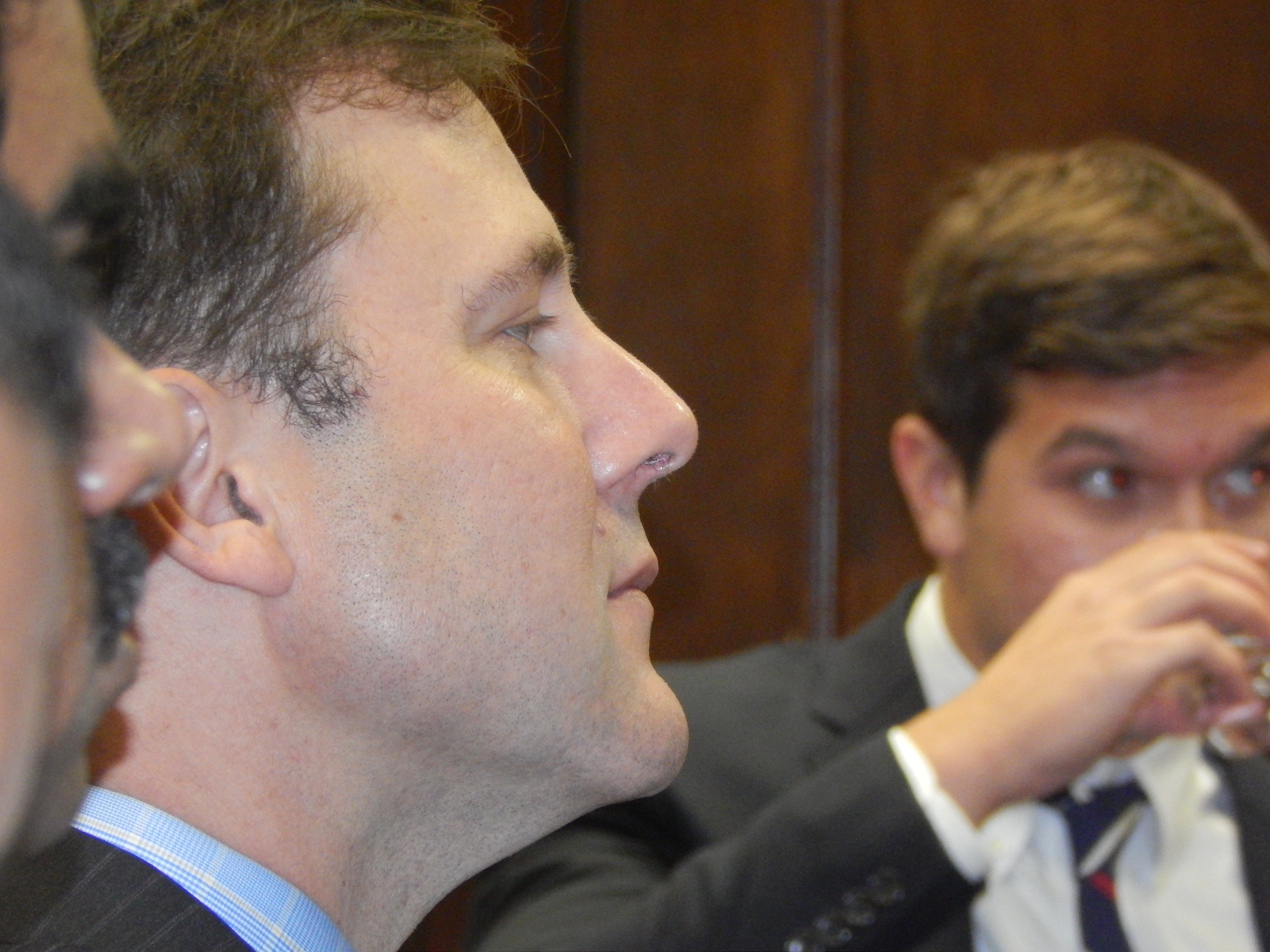
Christie was no party builder. His reliance on the Norcross relationships - particularly come budget crunch time - negated whatever expansive designs his GOP allies sought on his coattails. Hopeful of down-ballot dynamism and eager to seize on Christie momentum to build up his caucus, state Senate Minority Leader Tom Kean, Jr. (R-21) selected uniquely appropriate candidates for the 2013 cycle in Republican-leaning LD1 and LD3, only to find Christie absent on the trail in those districts, the deal to protect state Democratic Senators Jeff Van Drew and Sweeney apparently cut as the incumbent Governor instead campaigned up North in Hispanic-rich Essex and Hudson counties with two more Norcross allies, Essex County Executive Joe DiVincenzo and state Senator Brian P. Stack (D-33). That deeply frustrated Kean, who, because his caucus backed him and understood his good faith effort to recruit real candidates, managed to hold onto his leadership seat on the other side of the 2013 election, despite Christie and Sweeney trying to get rid of him.
Despite his Boston roots in a political world made by "all politics is local" shoe leather and Johnny Friendly dock fronts, the Hyannis Port-pulse racing Murphy's immersion in an adulthood of Goldman Sachs had given him enough of a Kennebunkport glow to make the likes of Tom Kean, Sr. comfortable, and that trickled down to the son. Kean, Jr. still nursed Christie-freezeout hurts by the time Murphy unpacked in a makeshift office building necessitated by his predecessor's much-decried decision to overhaul the governor's professional Statehouse digs.
[caption id="attachment_33411" align="alignnone" width="4608"]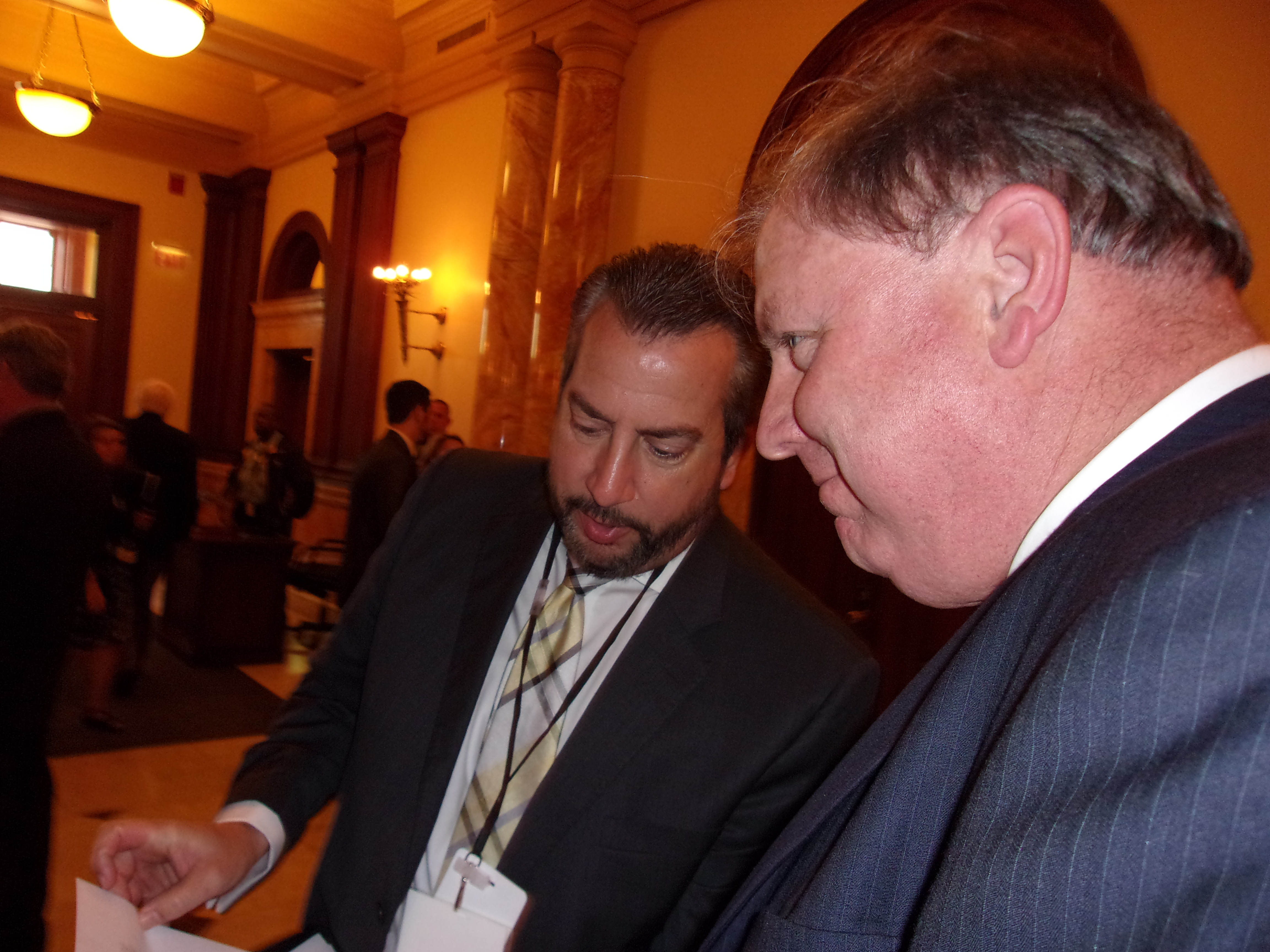 State Senator Joe Cryan (D-20) in the midst of the budget roil.[/caption]
State Senator Joe Cryan (D-20) in the midst of the budget roil.[/caption]
Kean and Sweeney hated each other. It started when Kean tried to run Nikki Trunk against the Senate President in 2013, and came to an infuriating head when the Republican leader worked with his own dreaded antagonist - the New Jersey Education Association (NJEA) - to oust the ex-ironworker in 2017. Sweeney was ready for Kean's recalcitrance, but now he had the added irritation of the powerful teacher's union going against him with the consent of Murphy.
So on the other side of the 2017 election with Christie finally gone but Norcross strengthened by legislative victories (in spite of the endangering view points) and Sweeney empowered as never before by overthrowing the NJEA in his backyard, Kean and Murphy - loosely - teamed up in Trenton.
Murphy wouldn't need Assembly Minority Leader Jon Bramnick (R-21).
He had Kean, the son of New Jersey's truly bipartisan elder statesman.
Whatever the gulf of political priorities between them, they shared the chill of Sweeney and the mild disdain of Norcross. Who needed the phone hook up to Norcross when Murphy had Kean, Sr. on the line? And, Murphy probably figured, he had former Governor Dick Codey still in the legislature, and Codey's former chief of staff, Pete Cammarano, now serving as his own chief of staff, and his own winning ability to turn on the charm with lumpy legislators if it came to that - where could they really go - and, in a real pinch, he had Oliver, who had herself served as speaker and - as a counterweight to Codey and Kean - could whip the lower house into shape on call.
What could possibly go wrong?
Sworn into office in January, Murphy enjoyed a grace period agitated by his already poor footing with Sweeney. By April, reporters who covered the Governor began to make no secret of their frustration over the lack of press conferences and press availability. "I wouldn't do any press conferences either, if I was him," one veteran Statehouse presence told InsiderNJ, referring to Murphy. "He doesn't know the issues here yet."
There was no evidence of panic in the front office.
Again, they had the relationships they needed on the inside, or so they thought. On the inside (and outside), they had a Governor with decent approval ratings who, with the legislature, had pushed through a liberal agenda in defiance of President Donald J. Trump, most critically on gun control, immigration rights protection, and equal pay. Murphy also had the most diverse cabinet of all time to reinforce his favorite narrative of progressive prince.
But Sweeney - seething over the NJEA-Murphy nexus and in no-rush mode - would make his stand on the budget, choosing Trump's elimination of state and local property tax deductions as his moment to backtrack from the Murphy-preferred millionaire's tax and choose instead an alternative revenue generator, the corporate business tax (CBT). The most ominous warnings - sounded as early as the 2017 Democratic Primary - about a Sweeney shadow government operating completely independent of the Governor-elect - began to take on starker delineations.
On increasingly shaky ground with a skeptical Statehouse press corps - turf that Sweeney had spent
[caption id="attachment_8547" align="alignright" width="300"] Assemblywoman Marlene Caride (D-36)[/caption]
Assemblywoman Marlene Caride (D-36)[/caption]
years finessing, particularly during those long lulls that Christie spent in New Hampshire - Murphy had another emergent disadvantage. Natural would-be allies like Assemblywoman Liz Muoio, Assemblywoman Marlene Caride, Assemblyman Vincent Prieto and Assemblyman Tim Eustace had all left the legislature. They might have been key building blocks toward a new majority - Muoio benefactor Mercer County Executive Brian Hughes - looked all-in with Murphy. But the new Governor tapped her for treasury, creating an opening for new Assemblywoman Verlina Reynolds-Jackson, unbeholden to Hughes, whose first significant political act was to stand at a press conference last month with Sweeney and company in support of the anti-Murphy budget. She would go on to join Murphy at a gubernatorial press conference days later, but much the way one might wear Team Murphy's jersey in a set-piece and then find a way to head the ball into the Governor's own net.
Caride's departure to the administration enabled state Senator Paul Sarlo (D-36) - a staunch Sweeney-Norcross ally - to summon Clinton Calabrese of Cliffside Park, an untested political neophyte who would do the bidding of the politically hyperkinetically connected Sarlo. A conservative at heart, Sarlo as a volunteer coach had to sit in the dugouts of South Bergen and listen to his pals question what the hell was going on with Murphy, who was dragging the party in too leftward a direction. The senator didn't push back. He was never among those forward-line allies of Bergen County Democratic Chairman Lou Stellato who backed Murphy in part to stick it to Sweeney and South Jersey, and Sarlo at the core was a political pragmatist who would - with no troubled conscience - play ball with Norcross.
[caption id="attachment_20333" align="alignleft" width="300"]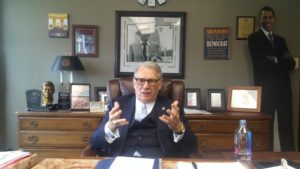 Stellato World[/caption]
Stellato World[/caption]
Heading into the budget season, Murphy also committed a significant gaffe, which soured Bergen County Democrats at the rank and file level, namely his political team's supposed plan to off-load the considerably politically accomplished Stellato to the sports authority and replace him with Adam Alonso, a Murphy inner sanctum member most charitably described by political insiders as a callow youth. As insiders contemptuously dissected the move and forced the Governor to shut down the option the same weekend his allies flagpoled it, he similarly reflected no deep-set consideration of the kind of hubris the plotting revealed. A newcomer to the New Jersey political world, Murphy - or his chief political thinkers - seemed to think the New Jersey governorship invested the office holder with untold power, to be respected simply on the strength of his being the Governor. In the wake of Alonso's dismantling, a Bergen bottom feeder gleefully outlined to InsiderNJ how party members had stuck it to Murphy by rejecting the beam-down of his alien hatchling in their midst. This was someone who was supposed to be a Murphy spear carrier, chortling as the Governor headed into the thick of his budget war with Sweeney.
Oh, well.
If they heard it at all, they still had Kean.
He'd deliver.
[caption id="attachment_29488" align="alignnone" width="2560"] Amy DeGise[/caption]
Amy DeGise[/caption]
Murphy received a final burst of energy just prior to the budget voting sessions in the form of NJEA-card carrier Amy DeGise defeating South Jersey ally state Senator Stack for the chairmanship of the Hudson County Democratic Organization (HCDO). DeGise prevailed in part by exposing Stack's eight-year sunny relationship with Christie.
Things were looking up, or so thought Murphy's allies.
Stack as chair would have looked bad, a reassertion of Christie world on the new Governor's watch, and a Sweeney caucus ally empowered.
DeGise demonstrated that if the state had its power centers, all of New Jersey didn't necessarily equate to South Jersey.
Then came June 21st, and two Republican senators, Bateman and Corrado, broke from the caucus Kean was supposed to rule with a patrician grip and backed Sweeney's $34.7 billion budget. It wasn't a huge surprise. But it was done.
Well, ok, but on the Assembly side Oliver would...
She wouldn't.
The Lieutenant Governor had been ill for most of the time of Murphy's early tenure. Perhaps Essex
[caption id="attachment_31934" align="alignleft" width="300"] Assembly Budget Committee Chair Eliana Pinor Marin and Senator Tony Bucco.[/caption]
Assembly Budget Committee Chair Eliana Pinor Marin and Senator Tony Bucco.[/caption]
Democrats saw her as sufficiently strong at the outset to be able to prevail on fellow East Oranger Essex County Democratic Chairman Leroy Jones to put Essex in play for Murphy. But Jones - having angered Sweeney when he backed Murphy for Governor - was trying to get back in the good graces of the volatile Senate President, while simultaneously soothing relations with Coughlin and Middlesex County. Jones wasn't about to put all of Essex in a rowboat for Murphy on the strength of a Sheila phone call. Plus, his own assemblywoman from the Ironbound, Eliana Pintor Marin, had scored budget chair - done a great job too, exceeded expectations, by the reckoning of everyone close to the process - and served as an alternative budget architect.
When Assemblyman Ralph Caputo (D-28) voted for the legislature's budget, it showed the depth of Team Murphy's miscalculation. Caputo - just like Assemblyman Tom Giblin (D-34) - was independent enough to be Murphy-malleable.
By the time Murphy World sounded the alarm bells, they were underwater.
In a jam-packed two weeks, Murphy began working the press the way he might have from the beginning of his term, doing press conference after press conference and going into the weeds of questions his critics said he wouldn't be able to handle. He was podium-serviceable, even good. But it was too late. The years-long head-start that Team Norcross had on him proved too heavy an 11th hour burden. The Governor played up until the final minute, but, with a deadline on the horizon at the end of last month, at last had to absorb more of what Sweeney wanted, including a version of the CBT and a version of the so-called mega-millionaire's tax that the Governor had, only a day earlier, eschewed as insufficient to fund his proposed $35.6 billion budget. The establishment would, in the hours and days following, delight in the abilities of Team Sweeney and Coughlin to outhustle and outplay the Governor inside the paint.
The final press conference on a Saturday evening just ahead of the deadline found Murphy, so adept in the immediate preceding days, taking only a few questions from the press, as he let the merry image of himself surrounded by Sweeney, Coughlin and their lieutenants to sink in as a final testament to same-page unity. "We're Democrats," Sweeney tried, presumably making light of his relentless efforts to beat up Murphy during that muggy month of June, exceling through preparation to impose himself like a barbed wire hedgerow where Murphy could only huff and puff late to an obvious compromise finish.
[caption id="attachment_13610" align="alignnone" width="4608"]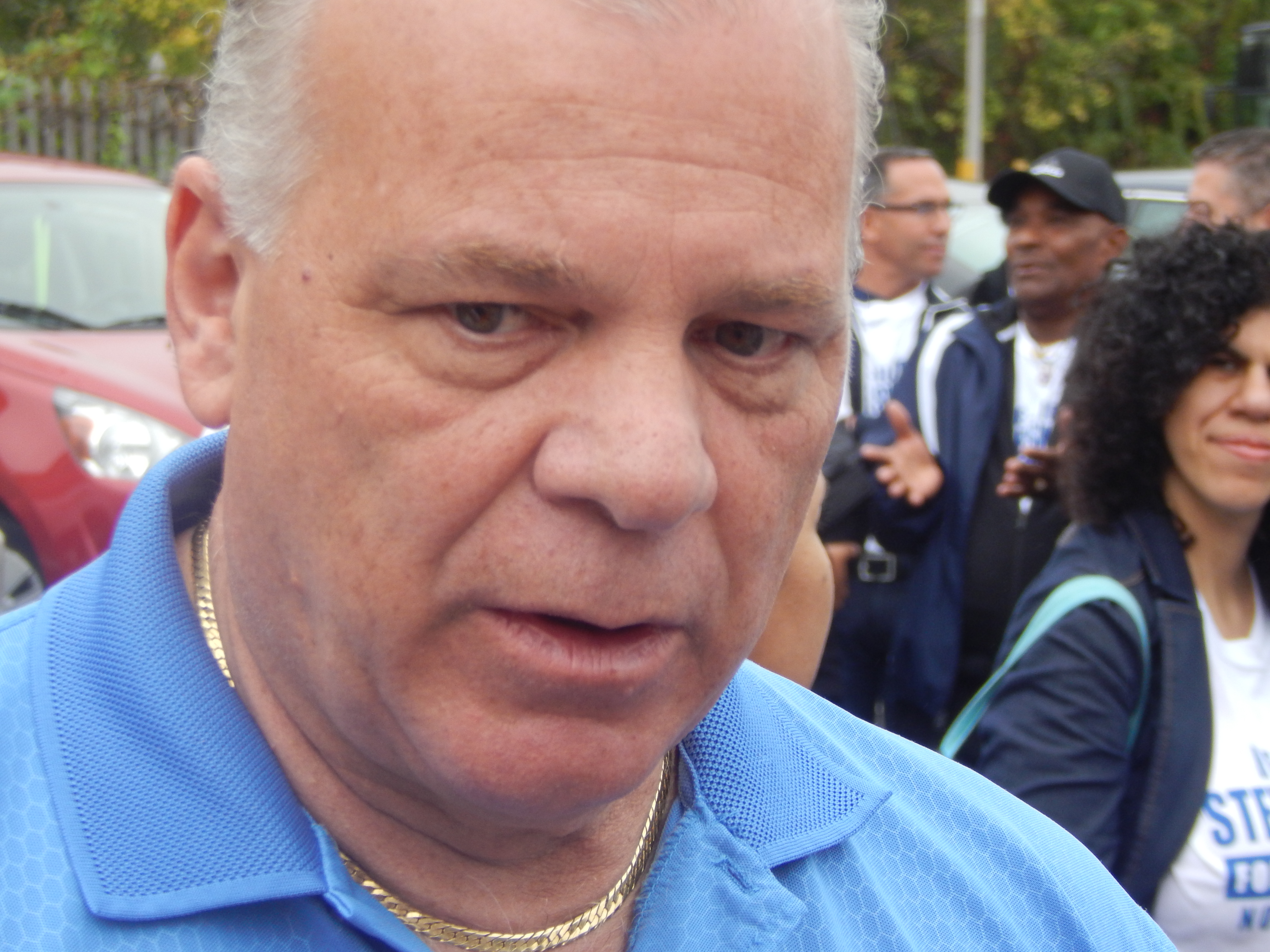 Sweeney[/caption]
Sweeney[/caption]
Whatever the enduring communications Sweeney had with Christie, and however fruitful or merely headache-riddled for the Senate President, as the former Governor admitted to friends that he missed the action, Murphy's phone contacts - starting with the Keans - proved less than kill-shot-conducive.
The most significant question remained.
The respective staffs of Sweeney, Murphy and Speaker Craig Coughlin in the aftermath of the grueling budget process spoke of the experience forging closer, budget foxhole bonds. Yet, would Murphy - now bruised by the backchannel wars that ultimately forced him to cave on the millionaire's tax as he envisioned it - pick up the phone and work in the same pragmatic, self-interested way Christie had, however distasteful and contrary to the vision he had of himself as a product above that rank dislocation of the people's business, so hurtful and harmful to Codey, otherwise known as boss politics? Or, invigorated by his own demonstration of guts in resisting for days on end the supposed Norcross imperative, would he dig in with his commitment to operating without interference, and reconfigure his team and
[caption id="attachment_1603" align="alignright" width="150"] Webber.[/caption]
Webber.[/caption]
how it plays on the field, maybe - with the help of progressive groups that stood with him - the CWA, POP and the ATU and urban leaders like the ever independent Newark Mayor Ras Baraka - even play in some primaries come 2019 to put an indelible imprint on budding lawmakers seeking a new boss, even if it meant eating the canvas again in a grubby, unforgiving gym far from the national-sized lights that Murphy - just like Christie before him - apparently craved?
Mid-term elections would offer another battlefront, one that contained more obvious national-level implications, where - for the likes of Assemblyman Jay Webber (R-26), who rose in opposition to the Democrats' proffered priorities, and others - the budget season, and everything it revealed about the Dems and their leadership, would boomerang, the Christie-era-routed GOP hoped with a vengeance.





